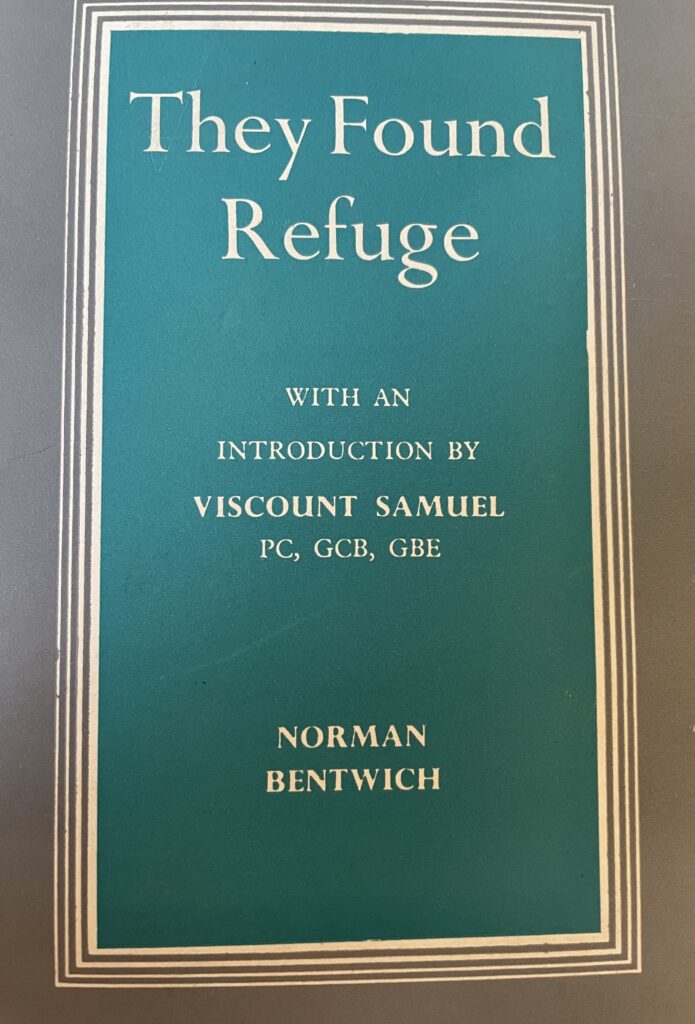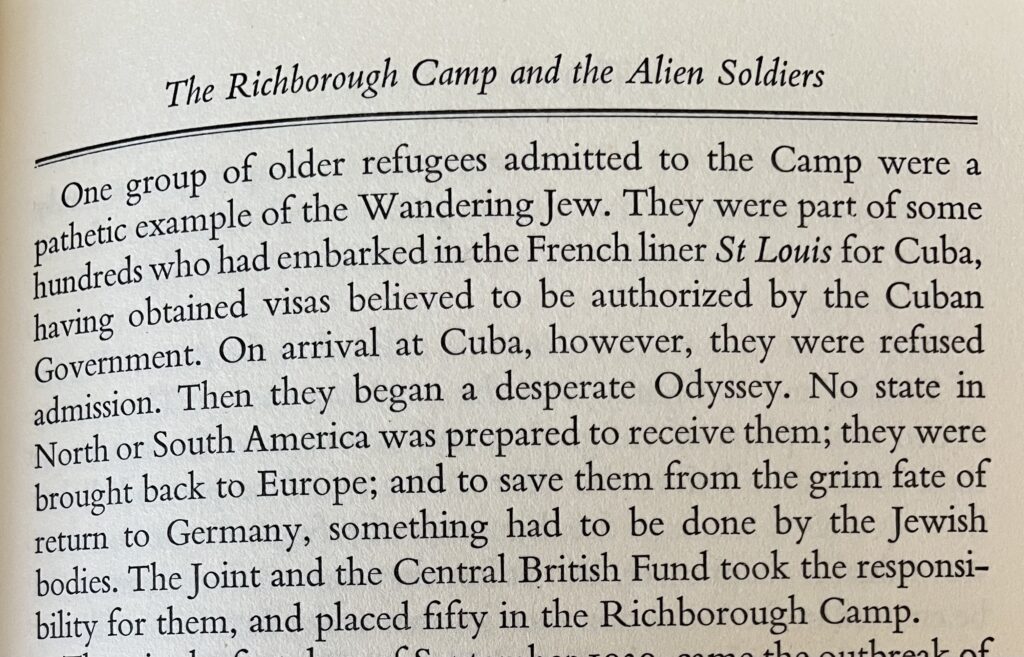Phineas May’s Diary mentions that 27 passengers from the St Louis arrived at Kitchener camp in June 1939.
Wednesday, 21 June 1939 So the longest day has now gone. I spent the afternoon with two of my staff and the Sports Master of the Sir Roger Manhood School getting the school grounds marked out for Saturday. It all has to be marked out excellently. It is a lovely ground. The boys of the school were playing outside and it took me back to my boyhood again. A party of 27 men arrived who had been stranded off Cuba on the St. Louis.
See also this Timeline entry, below:
3 May 1939
The St Louis sets sail
Over 900 passengers – most of them Jews – are bound for Cuba initially, and then the USA. Most passengers have applied for US visas.
On 8 May, around 40,000 people take part in an antisemitic demonstration in Havana: the Cuban president invalidates all recently issued landing certificates.
On 2 June the St Louis is ordered out of Cuban waters and sets sail for Miami. Sailing close to Florida, some passengers cable President Roosevelt asking for refuge: he does not respond.
The ship is forced to return to Europe.
Jewish organizations (particularly the American Jewish Joint Distribution Committee) negotiate with four European governments to secure entry visas: Britain takes 288; the Netherlands 181; Belgium 214; and France 224.
Those who make it into Britain survive the war (except one, who is killed during an air raid). Of the other 620 passengers, 87 emigrate before the German invasion of Western Europe, but 532 are trapped by the invasion.
Of these, just over half – 278 – survive the Holocaust (Source: USHMM).
The project has heard from the family of one of these passengers, whose materials can be found here: https://kitchenercamp.co.uk/list-of-names/siegfried-mannheimer/
According to Norman Bentwich in They Found Refuge (1956), 50 St Louis passengers ended up at Kitchener in summer 1939


There is some information about the voyage at USHMM
https://encyclopedia.ushmm.org/content/en/article/voyage-of-the-st-louis
https://encyclopedia.ushmm.org/content/en/timeline-event/holocaust/1939-1941/st-louis-voyage
The Centre for Jewish History has the following collections
https://archives.cjh.org/agents/corporate_entities/36956
JDC Archives, Topic, The Story of the S.S. St. Louis (1939) https://archives.jdc.org/topic-guides/the-story-of-the-s-s-st-louis/
Some British newspaper articles were published about St Louis refugees who were given refuge at Kitchener camp.
Transcriptions follow.
Images of the originals can be found in the British Newspaper Archive online.
The Staffordshire Sentinel, Wednesday 21 June 1939
200 Wandering Jews Find Sanctuary AFTER VAIN VOYAGE OVER ATLANTIC An elderly man with a long black beard walked ashore from a German liner at Southampton to-day, swept off his hat and bowed low to the people on the quayside. He was a wandering Jew, one of 200 German exiles, and his wanderings were at last over. He had found sanctuary in Britain. This man and the 199 others who accompanied him on the liner had travelled to New York, to Cuba, back to Holland, then to Belguim and France in their search for a home. Officials of the German Jewish Aid Committee met the refugees at Southampton Docks and guided them through the long and complicated immigration formalities. They came ashore in batches of 50. ALL THEIR POSSESSIONS “They are a good middle class German Jew. A number are highly skilled in professions and some are really distinguished," said a German Jewish Aid Committee official. The refugees brought 100 tons of luggage with them – all their worldly possessions. A little old lady in black was the first to walk ashore down the gangway and then came a baby carried in a pram by two stewards. There was a number of young children. Each refugee had a packet of food tucked under his or her arm. "When I heard that we had been rejected from Cuba and we were coming back to Europe I begged to be allowed to come to England,” said one refugee. "I read so much about this lovely country and its people. I am happy about the future.” Many of them will stay at Richborough Camp in Kent, which was known as “Kitchener's camp" during the war. Quite a number, after a year in England, hope to go to America where they have relatives.
Daily Herald, Thursday 22 June 1939, extracts
287 Jews Say "In Sicherheit" – Safe! BY A SPECIAL CORRESPONDENT In boarding houses, hostels boarding houses, hostels and camps throughout the Home Counties, 287 German Jews, who had sailed half way round the world looking for sanctuary, went to English beds last night murmuring: "In Sicherheit" – Safe! You have followed the voyage of the misery ship St. Louis, which left Germany for Cuba and the West Indies ports, only to be told that no Jews could land. Now get a close-up of some of those people who last night murmured "In Sicherheit," after roaming the seas for a home. I was the first to greet them on English soil at Southampton yesterday morning. I was with some of them last night, hearing of their family partings, the loves left behind, their children scattered around the world. Meet the man whose sense of humour stoppedmass hysteria when all seemed lost. Max Schlesinger, of Vienna, was the man who chased away the St Louis blues. He laughed the ship back to sanity when one man had already attempted suicide, and others were becoming unbalanced. Merry Max Merry Max with is rolling eyes and jauntily placed check cap, was the life and soul of the party. What if it were true that a concentration camp was being prepared for their return to Hamburg. “Get bronzed in the sun. We’re on a cruise. Let’s enjoy it.” He said that every day. … Honeymoon Pair Among the refugees were fathers and mothers, wives and husbands, who had their families waiting for the in Cuba. Bruno Glade, Berlin pianist, was one of those. His family left Germany a fortnight ahead of him. When the St Louis reached Cuba, his wife and two children were there to wave to him. But he could not go ashore. They wept as the bows of the liner turned towards the sea. They are still there – hoping and waiting. Herr Glade is staying at the Richborough Camp, Kent, with other male refugees…
Yorkshire Post and Leeds Intelligencer, Thursday 22 June 1939, extract
HOMELESS JEWISH REFUGEES 287 arrive in London ...The refugees left the train coach by coach, and were then escorted to a fleet motor coaches waiting besides the platform. Some will stay with relatives and guarantors, 27 the men will to the (Kent) camp, and the remainder will find temporary homes in hotels the guests of the German-Jewish Aid Committee. ...
